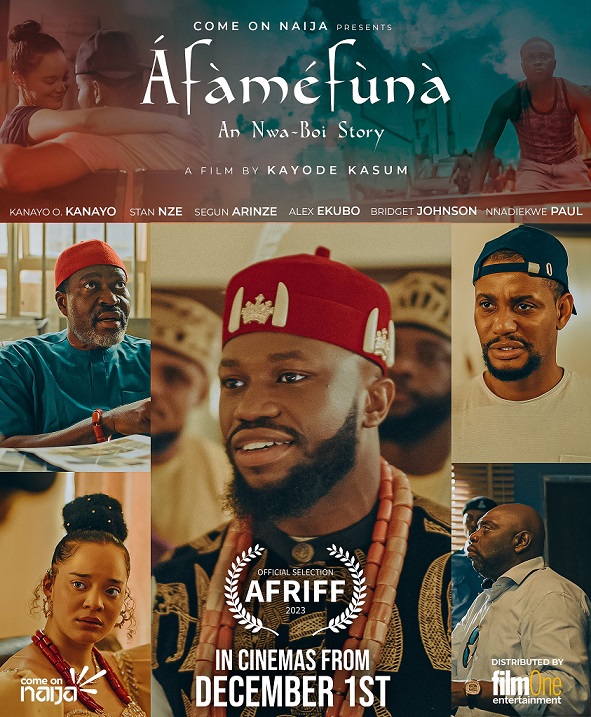When Afamefuna’s mother brings him to a businessman called Odogwu to become his nwa boi, his apprentice, young Afaemefuna is introduced to a new world larger than the one he had known in his village. Odogwu welcomes Afamefuna with open arms, and lays down the three fundamental rules of his business operation: respect customers, avoid stealing, and steer clear of womanizing, to which Afamefuna nods in understanding. He soon forms a close bond with the senior apprentice, Paul, assigned to teach him the ropes of the trade. Paul is a jolly fellow, his crooks known to him, and with his influence, Afamefuna adjusts to the hustle and bustle of the market and the streets of the commercial city of Onitsha.
Kayode Kasum’s Afamefuna: An Nwa Boi Story opens in the present day, when Paul is murdered and the police have a suspect. Across town, Afamefuna is celebrating his father’s memorial with friends and relations. The air is filled with Igbo highlife music, currency notes fluttering as attendees revel in the moment, and then the police arrive. They want Afamefuna for questioning. They want details of his relationship to Paul, going as far back as their time as apprentices.
In Igbo culture, the concept of “Igba Boi,” the Igbo Apprenticeship System, is more than simply a framework of formal and informal indentured agreements that breed young boys into seasoned businessmen; it is a rite of passage, a ritual of manhood in which the nwa boi, apprentices, are taught the principles of discipline and resiliency. Kayode Kasum mines this not only for philosophy but as a scaffolding for the story. Amidst the drama, the story foregrounds the daily life of a nwa boi — in scenes where the boys carry out house chores, scenes where they disagree. Soon, the young men are all grown.
While still serving, Odogwu takes a special liking to Afamefuna after he demonstrates his dependability and diligence, and decides to “settle” him before Paul, his senior colleague. Paul’s ensuing anger not only ends the friendship but sets the stage for a lifetime of bitterness that ends in catastrophe. Complicating things is the love triangle involving the two men and Odogwu’s daughter Amaka.
Kasum’s direction is tight in the first half. Emmanuel Igbekele’s colour grading is brilliant, complementing the general tone and timelines. Anyanwu Sandra Adaora’s screenplay does impressive work reflecting history in the dialogues, highlighting the resilience and communal spirit of the Igbo people, post-Biafran War. “The Igbo business collapsed after the war,” Odogwu tells Afamefuna. “Afamefuna, the war did something to us. War is bad.” It is authentic writing, even as Kasum’s final-third pacing leaves a few subplots rushed. For instance, Amaka’s interactions with Afamefuna and Paul could have been explored further, given depth, to add emotional weight. The lack of that makes even more questionable Paul’s certainty that Afamefuna’s son is his.
Most of the performances work. Young Afamefuna is played by Paul Nnadiekwe but it is the older version, portrayed by Stan Nze, that is compelling. With depth and sensitivity, Nze carries the character’s growth from a naive apprentice to a successful businessman. Paul, the story’s best character, is played while younger by Chidera David and older by Alexx Ekubo. David brings an upbeat charisma to the street-smart personality and is an actor to watch. Ekubo balances the older Paul’s jealousy and vulnerability.
A compelling scene is when Nze’s Afamefuna, freshly blessed by Odogwu and still trying to recover from the shock, approaches Ekubo’s Paul to celebrate. The tension is palpable with Paul’s seething jealousy. “You have taken what belongs to me,” Paul tells Afamefuna. “From today onward, we’re no longer brothers. Everyone to their business.”
Kanayo O. Kanayo’s Odogwu is a formidable presence, exuding wisdom and authority and love. Around the 30-minute mark, his apprentices are gathered around him as he tells them the story of a certain Osita who met his fall from his mischief and unfaithfulness to his oga. Odogwu is both mentor and father figure, an example of what a good oga means to a good apprentice.
As CSP Gidado, Segun Arinze is engaging in the investigation room, accusing Afamefuna of murder. His switch between Hausa and Igbo accents is seamless. But Atlanta Bridget Johnson is miscast as Amaka: her portrayal of a pivotal character is underdeveloped, and her facial expressions fail to enhance our understanding of her decisions.
The minor pacing struggle of Afamefuna: An Nwa Boi Story, and its more obvious trouble with resolution, casts no shadow on its triumph of cultural storytelling. It is an expository and entertaining look at the heart of the Igbo Apprenticeship System. Its satisfactory weaving of tension and humanity suggests one thing: Kayode Kasum and Anyanwu Sandra Adaora should collaborate again. ♦
If you love what you just read, please consider making a PayPal donation to enable us to publish more like it.
More Film & TV Reviews from Open Country Mag
— Breath of Life, Reviewed: Faith, Redemption, & Male Friendship
— Ebrohimie Road, Reviewed: A Literary Legend as Father & Husband
— A Tribe Called Judah, Reviewed: A Box Office-Breaking Heist of Authenticity & Heart
— Jagun Jagun, Reviewed: New Heights for the Nollywood Historical Epic
— The Real Housewives of Lagos, Recapped & Reviewed: Glamour & Drama in Las Gidi
— Battle on Buka Street, Reviewed: Blockbuster Dramedy with Emotional Burn
— The Trade, Reviewed: Kidnappers Vs. Police
— King of Thieves (Agesinkole), Reviewed: A Captivating Yoruba Epic
— Gangs of Lagos, Reviewed: A Crime Thriller with Big Ambition
— Brotherhood, Reviewed: A Policeman and a Robber
— Shanty Town, Reviewed: Crime and Punishment, Fate and Freedom
— A Sunday Affair, Reviewed: A Stumbling Story of Romance and Tested Friendship
— Prophetess, Reviewed: A Modernist Portrayal of Faith
— Blood Sisters, Reviewed: A Rousing Murder Thriller
— La Femme Anjola, Reviewed: An African Neo-Noir Titillates in Crime and Lust
— Swallow, Reviewed: Perturbance in Ordinary Lives
— Ife, Reviewed: Lesbian Love in Bourgie Lagos
— Nne, Reviewed: Two Mothers and a Son
— The Men’s Club, Reviewed: A Charming Depiction of Male Friendship



One Response
Kindly help me with the background song at the traditional wedding.